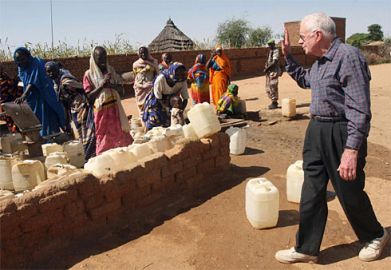US Carter to visit Sudan next February
January 29, 2010 (Khartoum) – Former US president, Jimmy Carter, will pay a four-day visit to Sudan for talks with Sudanese official on the upcoming election and heath programs implemented by his foundation.

During his next month visit which will take place during February 8 – 12, the former president and head of Carter Center will focus on the upcoming electoral process and health projects to eradicate Ghana Guinea Worm and River blindness.
Carter will meet the President Omer Al-Bashir, FirstVice President Salva Kiir, and the chairman of the National Election Commission Abel Alier as well as leaders of political parties.
The Carter Center is the sole foreign body, for the moment, to conduct election observations in Sudan and issued several papers on the electoral process in the country praising or criticizing its management by the Sudanese authorities.
In an interview with Voice of America in October 2007 Carter said “We hope that we can help to arrange an honest election now scheduled for 2009, including a census that is supposed to begin next February to prepare for the voters list that will be used in the election. So we hope we can break a deadline and prevent future deadlock and open up the way for progress in the future.”
Founded in 1982, the Carter Center has made tremendous contribution to improving life and alleviating human suffering in more than 65 countries around the world by resolving conflicts; advancing democracy, human rights, preventing diseases; and improving mental health care.
Deputy director of the US office at the foreign ministry, Ambassador Abu-Salih ,told the official SUNA that Carter would discuss with the Sudanese minister of Health Mrs. Tabitha Boutros the role of Carter Centre for eradication of Guinea worm disease combating the river blindness disease in southern Sudan and ways to speed up the efforts in this regard.
(ST)
